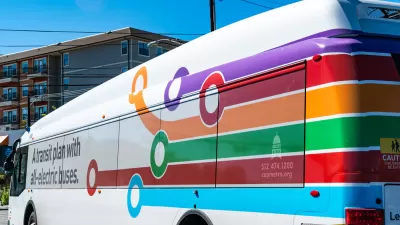The document develops a framework for ensuring that the most vulnerable and low-income residents benefit from investments in public transit and new housing and amenities.

Austin’s CapMetro has released a study on equitable transit-oriented development (ETOD), a concept that “strives to ensure that those who have the greatest need for transit enhancements are also able to benefit from the improvements.”
The study was funded through the Federal Transit Administration’s (FTA) Transit-Oriented Development Pilot Grant and creates a framework for guiding future development in the city based on six key goals.
The study assessed local challenges such as rising rents, pressures on small businesses, gaps in current transit service, and more.
In contrast with traditional TOD, ETOD focuses on ensuring that all residents benefit and low-income households are not displaced as areas become more dense and transit-accessible. “At the core of ETOD is the tenet that new transit
infrastructure should be accompanied by policies and strategies to mitigate displacement
of existing residents and create economic opportunity for all Austinites to thrive.”
See the source document for the full report.
FULL STORY: Equitable Transit Oriented Development Study

Manufactured Crisis: Losing the Nation’s Largest Source of Unsubsidized Affordable Housing
Manufactured housing communities have long been an affordable housing option for millions of people living in the U.S., but that affordability is disappearing rapidly. How did we get here?

Americans May Be Stuck — But Why?
Americans are moving a lot less than they once did, and that is a problem. While Yoni Applebaum, in his highly-publicized article Stuck, gets the reasons badly wrong, it's still important to ask: why are we moving so much less than before?

Using Old Oil and Gas Wells for Green Energy Storage
Penn State researchers have found that repurposing abandoned oil and gas wells for geothermal-assisted compressed-air energy storage can boost efficiency, reduce environmental risks, and support clean energy and job transitions.

Updating LA’s Tree Rules Could Bring More Shade to Underserved Neighborhoods
A new USC study finds that relaxing Los Angeles’ outdated tree planting guidelines could significantly expand urban tree canopy and reduce shade disparities in lower-income neighborhoods, though infrastructure investments are also needed.

California's Canal Solar Projects Aim to Conserve Resources and Expand Clean Energy
California’s Project Nexus has begun generating electricity from solar panels installed over irrigation canals, with researchers and state agencies exploring statewide expansion to conserve water and boost clean energy production.

HHS Staff Cuts Gut Energy Assistance Program
The full staff of a federal program that distributes heating and cooling assistance for low-income families was laid off, jeopardizing the program’s operations.
Urban Design for Planners 1: Software Tools
This six-course series explores essential urban design concepts using open source software and equips planners with the tools they need to participate fully in the urban design process.
Planning for Universal Design
Learn the tools for implementing Universal Design in planning regulations.
Heyer Gruel & Associates PA
City of Moreno Valley
Institute for Housing and Urban Development Studies (IHS)
City of Grandview
Harvard GSD Executive Education
Salt Lake City
NYU Wagner Graduate School of Public Service
City of Cambridge, Maryland





























